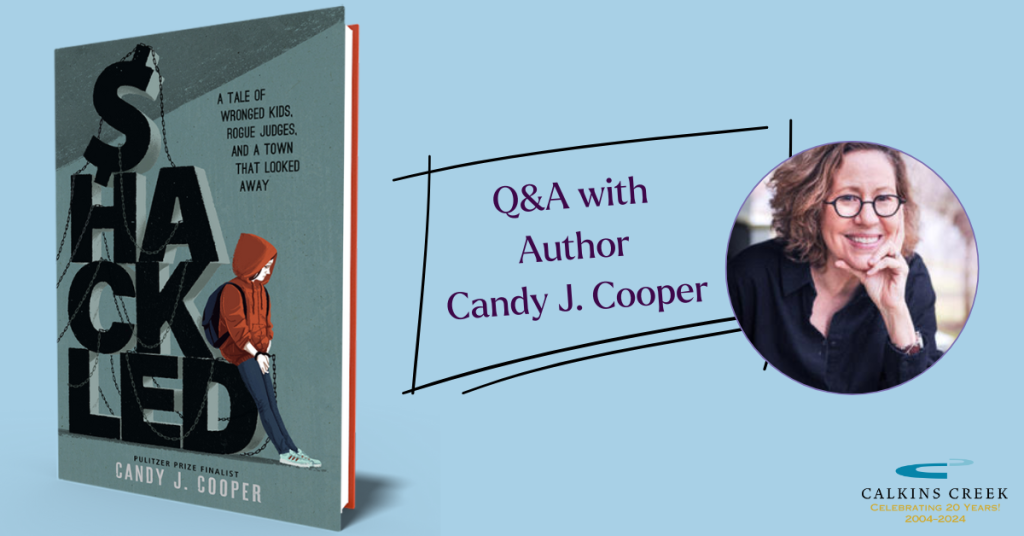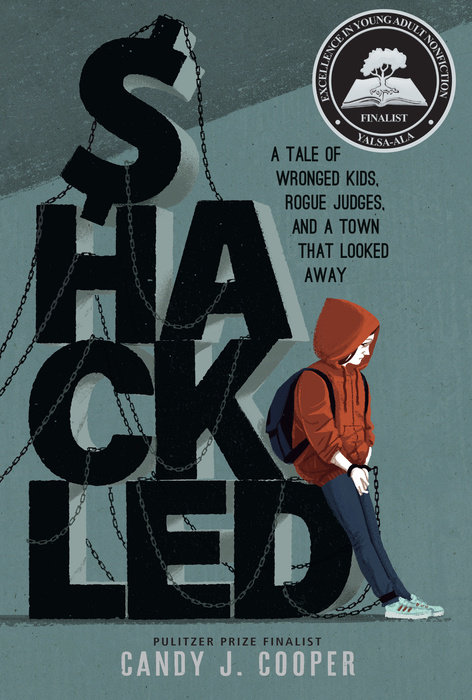SHACKLED Q&A WITH AUTHOR CANDY J. COOPER

Shackled: A Tale of Wronged Kids, Rogue Judges, and a Town that Looked Away is the explosive story of the Kids for Cash scandal in Pennsylvania, a judicial justice miscarriage that sent more than 2,500 children and teens to a for-profit detention center while two judges lined their pockets with cash. Author Candy J. Cooper, an award-winning journalist and Pulitzer Prize finalist, reveals more about why she wrote the book in this informative Q&A.
What prompted you to write about the Kids for Cash scandal in Pennsylvania? Why was it important for you to share this modern American history with a young adult audience?
I have always written on social justice themes, and very often about children. I worked on one book, Poisoned Water, about the Flint water crisis, with editor Susan Dobinick, now at Astra. She essentially grew up with the Kids for Cash story in her backyard, in Northeastern Pennsylvania. She sent me a link to a documentary, Kids for Cash, which outlined the story. I started researching, with an eye to what was new. The criminal cases against the corrupt judges concerned all of the ways they had scammed, conspired and otherwise violated federal laws. That was fascinating. What was missing from those proceedings was the human side of the story, what a federal judge in 2002 described as the “vast human toll.” It was the legacy of the corruption over 20 years. A Kids for Cash 2.0. I thought youth readers and even adults might care about what had happened to these kids, or what it’s like to be a kid in a courtroom, or a kid locked up. I think young adults often possess an acute, radar-like sense of what is fair and unfair. And YA readers are young enough to think about these injustices as they move into their adult lives.
As a Pulitzer Prize finalist and longtime journalist, research is front and center for you. How long did it take you to research the book, and what was your research process?
It’s a blur! A year or more of research, and then at least another year-plus of writing and revising while also researching. I started by immersing myself in the universe of written and recorded materials already in existence. Kids for Cash had generated two decades-worth of newspaper and TV stories, hundreds of legal filings, a state investigation, a book, the documentary, a podcast. History books! Then I started looking for people, and it took time to find and contact them and then to establish relationships. The first chapter of Shackled tells Carisa Tomkiel’s story. I found her on social media, and we spent a long time online just talking about talking. Another gift to this book came with a series of hearings held in federal court in 2021 in a class action lawsuit with 313 plaintiffs, each given an opportunity to speak in open court. I attended a number of those hearings, in Harrisburg and Wilkes-Barre. To listen to so many people remember verbatim their interactions with the juvenile judge, to hear the similarities among them, and to watch even hardened prison inmates cry over what they remembered in juvenile court, it knocked me out. But It allowed me to witness and feel the utterly formative and disabling effects of their early incarcerations.
What do you hope young readers will learn and take away after reading Shackled?
Reviewers and readers are capturing the takeaways better than I. One reviewer said he hoped the book “inspires some young people to become activists and to get involved in one of the many fields that relate to the story–education, the judicial system, psychology, journalism, etc.” An educator wrote, “This book should be read by as many people as possible. It is a perfect example of what can happen when people stay quiet instead of supporting each other to stand up for what’s right and how even the most powerful people need to be challenged and held to account for their actions.”
Those are perfect examples of my own hopes for Shackled. I want readers to think about how crucial it is to speak up in the face of wrongdoing. I want them to think about the harm that can come when people in positions of power ignore the rules and make up their own. If Shackled persuades even one young person to find a passion for reform, then I’ll be gratified to have lived with these gut-wrenching stories over the past three years.
Shackled is available now!
In the early 2000s, Judge Mark Ciavarella and Judge Michael Conahan of Luzerne County, Pennsylvania were known as no-nonsense judges. Juveniles who showed up in their courtrooms faced harsh words and even harsher sentencing. In the post-Columbine era, many people believed that was just what the county needed to ensure its children and teens stayed on the straight and narrow path. But as more and more children faced shocking sentences for seemingly benign crimes, and a newly built for-profit detention center filled up further and further, a sinister pattern of abuses and bribery emerged. Through extensive research and original reporting leading into contemporary times, award-winning journalist Candy J. Cooper tells the story of a scandal that the Juvenile Law Center calls “one of the largest and most serious violations of children’s rights in the history of the American legal system.”
“From cover to cover, SHACKLED is a stellar read and an absolute must-have for all those serving tweens and teens.” —Richie Partington, Richie’s Picks
“A highly readable and thought-provoking addition to true crime collections for teens.” —School Library Journal


